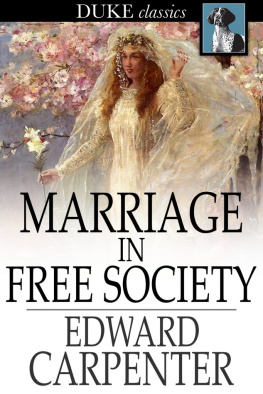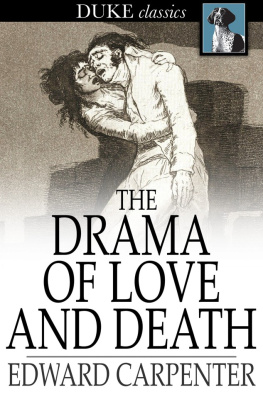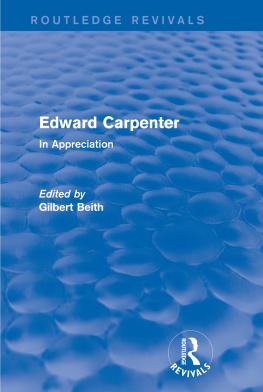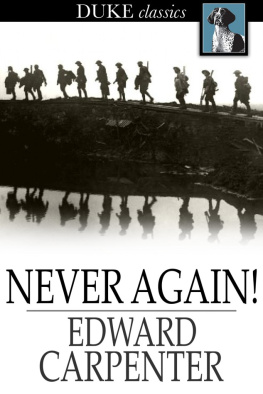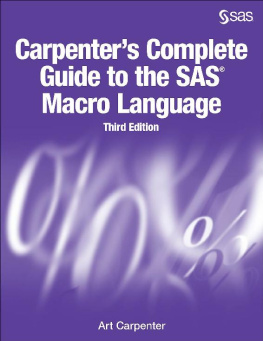Routledge Revivals
The Intermediate Sex
The Intermediate Sex collates papers from Edward Carpenter on his ideas about intermediate types. Carpenter claims that there are those in varying cultures that hold an intermediate position between the two sexes and may have an inner sex in their mind that is different from their biological sex. Originally published in 1908, this version in 1941, these papers present early observations about gender fluidity in both men and women, studying certain types of intermediate people that he claimed were beginning to emerge more obviously at the time of writing. This title will be of interest to students of gender studies and anthropology.
The Intermediate Sex
A Study of Some Transitional Types of Men and Women
Edward Carpenter
First published in 1908
By George Allen & Unwin Ltd
This edition first published in 2016 by Routledge
2 Park Square, Milton Park, Abingdon, Oxon, OX14 4RN
and by Routledge
711 Third Avenue, New York, NY 10017
Routledge is an imprint of the Taylor & Francis Group, an informa business
1908 Edward Carpenter
All rights reserved. No part of this book may be reprinted or reproduced or utilised in any form or by any electronic, mechanical, or other means, now known or hereafter invented, including photocopying and recording, or in any information storage or retrieval system, without permission in writing from the publishers.
Publisher's Note
The publisher has gone to great lengths to ensure the quality of this reprint but points out that some imperfections in the original copies may be apparent.
Disclaimer
The publisher has made every effort to trace copyright holders and welcomes correspondence from those they have been unable to contact.
A Library of Congress record exists under LC control number: 10007316
ISBN 13: 978-1-138-18420-6 (hbk)
ISBN 13: 978-1-315-64533-9 (ebk)
The Intermediate Sex
A Study of Some Transitional Types of Men and Women
BY
EDWARD CARPENTER
LONDON: GEORGE ALLEN & UNWIN LTD.
RUSKIN HOUSE, 40 MUSEUM STREET, W.C.1
| First published | 1908 |
| Reprinted | 1909 |
| ' | 1912 |
| " | 1916 |
| " | 19l8 |
| " | 1921 |
| " | 1930 |
| " | 1941 |
All rights reserved
PRINTED IN GREAT BRITAIN BY
UNWIN BROTHERS LTD., WOKING
" There are transitional forms between the metals and non-metals; between chemical combinations and simple mixtures , between animals and plants, between phanerogams and cryptogams, and between mammals and birds.... The improbability may henceforth be taken for granted of finding in Nature a sharp cleavage between all that is masculine on the one side and all that is feminine on the other; or that any living being is so simple in this respect that it can be put wholly on one side , or wholly on the other , of the line.
O. WEININGER.
To First Edition
THE following papers, now collected in book-form, have been writtenand some of them publishedon various occasions during the last twelve or fourteen years, and in the intervals of other work; and this must be my excuse for occasional repetitions or overlapping of matter, which may be observable among them. I have thought it best, however, to leave them as they stand, as in this way each is more complete in itself. The second essay, which gives its title to the book, has already appeared in my "Love's Coming-of-Age" (edition 1906), but is reprinted here as belonging more properly to this volume.
A collection of quotations from responsible writers, who touch on various sides of the subject, is added at the end, to form an Appendixwhich the author thinks will prove helpful, though he does not necessarily endorse all the opinions presented.
E. C.
Contents
THE subject dealt with in this book is one of great, and one may say growing, importance. Whether it is that the present period is one of large increase in the numbers of men and women of an intermediate or mixed temperament, or whether it merely is that it is a period in which more than usual attention happens to be accorded to them, the fact certainly remains that the subject has great actuality and is pressing upon us from all sides. It is recognised that anyhow the number of persons occupying an intermediate position between the two sexes is very great, that they play a considerable part in general society, and that they necessarily present and embody many problems which, both for their own sakes and that of society, demand solution. The literature of the question has in consequence already grown to be very extensive, especially on the Continent, and includes a great quantity of scientific works, medical treatises, literary essays, romances, historical novels, poetry, etc. And it is now generally admitted that some knowledge and enlightened understanding of the subject is greatly needed for the use of certain classes as, for instance, medical men, teachers, parents, magistrates, judges, and the like.
That there are distinctions and gradations of Soul-material in relation to Sexthat the inner psychical affections and affinities shade off and graduate, in a vast number of instances, most subtly from male to female, and not always in obvious correspondence with the outer bodily sexis a thing evident enough to anyone who considers the subject; nor could any good purpose well be served by ignoring this facteven if it were possible to do so. It is easy of course (as some do) to classify all these mixed or intermediate types as bad. It is also easy (as some do) to argue that just because they combine opposite qualities they are likely to be good and valuable. But the subtleties and complexities of Nature cannot be despatched in this off-hand manner. The great probability is that, as in any other class of human beings, there will be among these too, good and bad, high and low, worthy and unworthysome perhaps exhibiting through their double temperament a rare and beautiful flower of humanity, others a perverse and tangled ruin.
Before the facts of Nature we have to preserve a certain humility and reverence; nor rush in with our preconceived and obstinate assumptions. Though these gradations of human type have always, and among all peoples, been more or less known and recognised, yet their frequency to-day, or even the concentration of attention on them, may be the indication of some important change actually in progress. We do not know, in fact, what possible evolutions are to come, or what new forms, of permanent place and value, are being already slowly differentiated from the surrounding mass of humanity. It may be that, as at some past period of evolution the worker-bee was without doubt differentiated from the two ordinary bee-sexes, so at the present time certain new types of human kind may be emerging, which will have an important part to play in the societies of the futureeven though for the moment their appearance is attended by a good deal of confusion and misapprehension. It may be so; or it may not. We do not know; and the best attitude we can adopt is one of sincere and dispassionate observation of facts.




